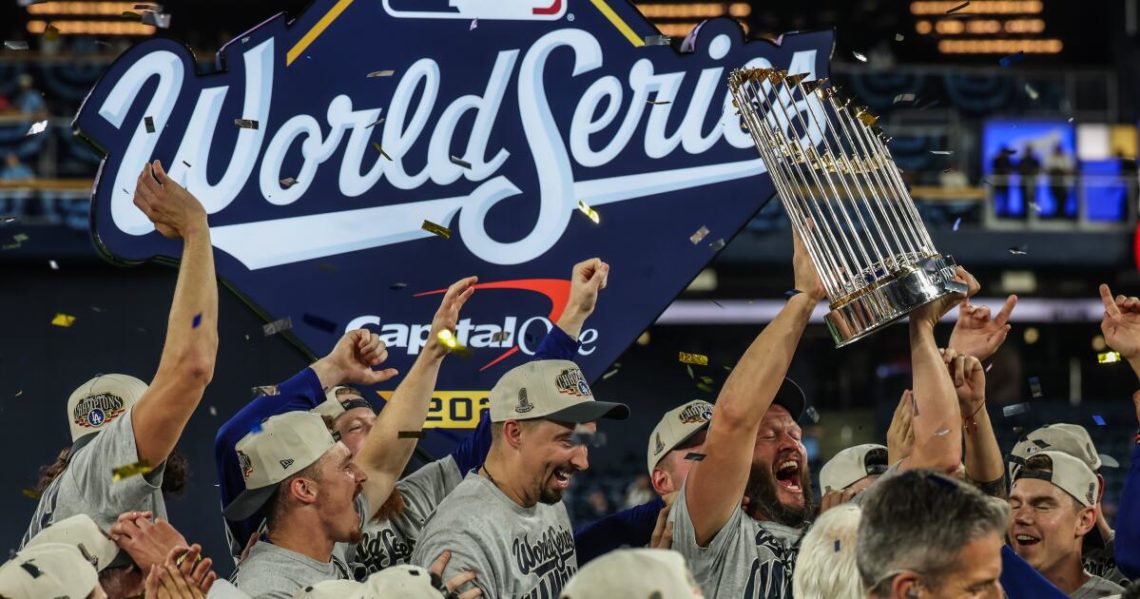With confetti at his feet, a drink in his hand and a smile of equal parts relief and elation planted on his face, Dodgers third baseman Max Muncy gave the question of the night only a cursory thought.
Had the Dodgers cemented a dynasty?
“I guess so,” he said.
Over the last six seasons, Muncy had been one of six Dodgers players to have a hand in all three of their recent World Series championships. He had become one of the faces of a team that elevated itself to historic all-time heights.
But when the topic of the club’s legacy came up, as he stood on the field in the wake of the Dodgers’ Game 7 thrill ride in Toronto on Saturday night, the 35-year-old veteran’s mind was occupied by another thought. The pride he felt emanated from a different source.
“The thing that I’m most proud of is the culture that we have created,” he said. “I hope that’s what’s talked about the most.”
In the public discourse, of course, it won’t be.
These Dodgers, with their star-studded roster and record-setting $415 million payroll and long-established reputation as big-spending villains who might be ruining baseball, have only further fueled debates about the financial inequities of the sport.
With a labor battle looming next year, they will be turned into a proxy — the prime example, critics will argue, of what’s wrong with the only major professional sports league in North America without a hard salary cap.
Some of those concerns will be justified (the Dodgers are spending at levels MLB has never before seen, and well beyond most of their competition). Others will be exaggerated (they are also spending within the league’s rules, and re-investing revenues back into their roster at a higher percentage than almost all other franchises).
The players themselves, however, really couldn’t care less.
Money, after all, might have given them the talent to win back-to-back World Series. But it took something else to help them get to, and especially conquer, the mental and physical test they faced in Saturday’s Game 7.
“When you come to the Dodgers, and you put on that Dodgers uniform, it’s all about, ‘How do you do what you need to do to win the game? How do you help the team win the game?’” Muncy said, his hoarse voice beginning to crack. “I seriously can’t put into words how much it means to me that we’ve created something that’s that special. that everyone knows about now.”
Culture and camaraderie might be clichéd traits easy to point to in the wake of any World Series championship, but they were nonetheless present in the Dodgers’ quest to repeat this year.
Take the first big turning point of this postseason: The iconic “wheel play” the Dodgers ran to defend a bunt in the ninth inning of Game 2 of the National League Division Series.
That maneuver was suggested and executed by Mookie Betts — a player the Dodgers signed for $365 million five years ago to be a Gold Glove right fielder, but who moved to shortstop out of roster necessity on a full-time basis this season and transformed into a Gold Glove finalist.
Dollars might be the reason Betts now plays in Los Angeles. But it was his tireless daily routine of taking infield grounders, and his ability to learn from and overcome early-season growing pains, that made that moment possible.
“For him to play that caliber of shortstop, I think, is underappreciated,” president of baseball operations Andrew Friedman said. “I don’t think people are paying enough attention to how difficult that was.”
Clinching the NLDS required contributions from another star talent serving in an unexpected new role.
When rookie Japanese phenom Roki Sasaki signed with the Dodgers this offseason, it enflamed the external worries about their hoarding of talent. Sasaki, however, struggled as a starter, missed most of the year with a shoulder injury, then faced a decision ahead of the playoffs about whether or not to move to the bullpen.
He accepted, despite having never been a reliever in his professional career before. And in the playoffs, he fulfilled the team’s gaping hole at closer, highlighted by the three perfect innings he pitched in their NLDS-clinching Game 4 win.
“For Roki to come through in that spot after the year he’s had,” Muncy said at the time, “that was just so huge for us.”
The NL Championship Series was the one time the Dodgers clearly outclassed a playoff opponent, rolling past the overmatched Milwaukee Brewers behind historic starting pitching performances from Blake Snell (a $182 million signing last offseason), Yoshinobu Yamamoto (a $365 million signing the winter before) and Tyler Glasnow (a $136.5 million acquisition), then an all-time two-way showing in Game 4 from Shohei Ohtani (the $700 million man who has been at the center of the consternation over the Dodgers’ spending).
The World Series, however, brought an unexpectedly stiff challenge from the Toronto Blue Jays — who were heavy underdogs to the Dodgers despite their own top-five payroll of $278 million.
In the Fall Classic, the Dodgers’ sheen of invincibility was shattered. Their lineup struggled. Only Yamamoto maintained his previous level of dominance in the rotation. A long-suspect bullpen finally faltered. And in many facets of the series (in which the Blue Jays outscored the Dodgers 34-26 and hit .269 to the Dodgers’ .203 team average), the Dodgers looked second-best.
“I mean, big picture-wise, we didn’t play very well,” Friedman said. “But those big pivotal moments is where our guys really showed up … Which I think gets at who they are, the compete, how much they care about each other, how much they care about bringing a championship back to LA in back-to-back years.”
There was Game 3, when the Dodgers prevailed in an 18-inning marathon by getting an unforeseen boost from little-known reliever Will Klein, who was willing to sacrifice his arm in a grueling four-inning outing despite spending most of this year stuck in the minors.
There was Game 6, when the team survived a potential season-ending, ninth-inning jam thanks to the veteran defensive instinct Kiké Hernández (the high-energy October stalwart who started every game of the playoffs after limited playing time in the regular season) and Miguel Rojas (who has become one of the emotional leaders of the team since being acquired in a 2023 trade for a minor-league prospect, despite also serving in a depth role for most of the summer) flashed on a victory-sealing double play.
“That’s what makes us really tough,” Rojas said. “[We’re] competing every single day, and regardless of what the situation is, I think everybody [is able to] just kind of forget about the past and focus on the moment right now.”
Game 7 provided the ultimate test.
The Dodgers trailed early, with Rogers Centre shaking after Bo Bichette’s third-inning three-run homer. They couldn’t lean on Ohtani, who looked gassed while starting the game as a pitcher on short rest. They had to claw their way back instead, playing from behind all the way into the ninth inning — when their season was two outs away from ending in failure.
“We just kept going and going and going,” Muncy said. “I’m just really proud of all the guys for not giving up hope.”
It would’ve been easy to do so. After two exhausting years — full of deep postseason runs and season-opening international trips and the daily pressure that came with their heavy offseason expenditures — the club’s tank appeared to be teetering on empty. Sheer talent, after all, can only sustain for so long.
“It’s been a long journey for the team, for the organization, for every player out here,” Rojas said before Game 6. “It’s been really stressful and everybody’s mentally tired.”
But this, Muncy declared, is where the Dodgers’ culture kicked in.
“It’s all about the team. It doesn’t matter about yourself,” he said. “When you’re coming in off the field and you have a whole group of guys in [the dugout] saying, ‘Hey, great inning. Let’s scrap something together. Let’s get a guy on base. Let’s get a run in,’ that kind of means everything.”
In the end, the Dodgers conjured their most heroic moments for when they needed them most.
With one out in the ninth, it was none other than Rojas — who was uncertain to even play in Game 7 after aggravating an intercostal injury the night before — who tied the score with a miraculous home run swing.
“When you play the game right, treat people right, are the teammate like Miguel is, I think we said it in there, the game honors you,” first baseman Freddie Freeman said. “Just doing whatever he could to help this team win.”
From there, the Dodgers (turning to their fourth traditional starter out of the bullpen on the night) summoned Yamamoto, who did something no record-breaking contract could have ever predicted by throwing 2 ⅔ scoreless innings on zero days’ rest after his 96-pitch start in Game 6.
“Can’t evaluate that,” Friedman said.
“That’s going to go down in history as one of the best championship performances in any sport,” pitching coach Mark Prior added.
Will Smith, one of the few homegrown talents on a team of hired guns, delivered the winning swing with his home run in the 11th.
“To me, he kind of epitomizes a lot of the success that we’ve had looking back,” Friedman said. “In terms of our scouting process, our player development process, how well they work together, and then him coming through and having the impact he’s had at the Major League level.”
And fittingly, it was Betts who recorded the championship-clinching outs on a double-play chopper hit to him at short.
“A perfect bow on what was an incredible season for what he did at shortstop this year,” Friedman said.
All of it, Muncy proudly noted, exemplified what the Dodgers maintain was the ethos of their team; the kind of intangibles that won’t show up on a balance sheet or payroll list, even with all the money they’ve spent.
“That’s what we’ve created here,” Muncy said. “And that’s what I’m most proud of.”
“We kept going, and we persevered,” manager Dave Roberts echoed. “And we’re the last team standing.”
The post Money helped Dodgers win the World Series. But they say culture got them through Game 7 appeared first on Los Angeles Times.




